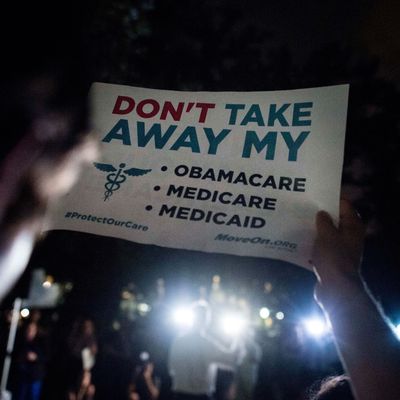
Whether it’s because congressional Republicans suddenly discovered they were rapidly running out of time to consider anymore Obamacare repeal-and-replace legislation, or because of Mitch McConnell’s strategy of operating in the dark, the Graham-Cassidy legislation has been sprung on us all in a very short period of time. Opponents of the legislation feel that they were caught unprepared for a last-minute whipping operation by Senate Republicans and the White House to enact this bill. And the ammunition that helped bring down earlier GOP health-care bills, calculations of the impact of the bill on insurance coverage and premiums from the Congressional Budget Office, will not be available before the deal goes down in the Senate.
But even as proponents and opponents of Graham-Cassidy play catch-up, the first signs of public reaction are coming in, and they are not positive. Public Policy Polling conducted a two-day poll of 638 registered voters (not a big sample, but not negligible, either) for a pro-Obamacare group this week, and probably because Republicans have lost credibility on health care, Graham-Cassidy doesn’t fare well beyond the GOP ranks, even though a lot of respondents didn’t feel like they knew enough about it to form an opinion.
PPP found 24 percent of respondents favoring Graham-Cassidy, and 50 percent opposing it, with 27 percent “not sure.” Narrow majorities agreed with negative predictions of the bill’s impact on health-care costs, insurance coverage, and the availability of health care for people with preexisting health conditions. 68 percent opposed holding a vote on Graham-Cassidy until CBO had a chance to assess the impact. And on the more basic question of what Congress should be doing, PPP found 32 percent wanting to “repeal the Affordable Care Act and start all over with a new healthcare law,” and 63 percent preferring to “keep what works and fix what doesn’t” in the ACA.
The crosstabs for the poll show the dilemma facing congressional Republicans. 47 percent of self-identified Republicans (and also 47 percent of 2016 Trump voters) approve of Graham-Cassidy, and only 21 percent disapprove. But among independents, who are clearly wary of GOP health-care designs, only 11 percent approve of the bill, while 58 percent disapprove.
Here’s what Republicans really need to think about, though, in terms of the political consequences of racing this bill toward Donald Trump’s desk: Graham-Cassidy is very likely to become less popular in the near future.
Yes, the GOP can get a Senate vote, and perhaps even a rubber-stamp vote from the House, with nothing but the barest CBO assurance that the bill doesn’t violate the Congressional Budget Act. But congressional Democrats can and will procure a full assessment, and it very likely won’t be pretty. Based on CBO assessments of previous GOP bills with similar features (e.g. termination of the Medicaid expansion, a per-capita cap, state waivers of essential health benefit and price discrimination provisions, and elimination of the individual and employer mandates), Graham-Cassidy will almost certainly be “scored” as killing health coverage for 20 to 30 million or more Americans, and causing a big initial spike in health-care premiums.
Beyond these dire estimates, the other post-enactment buzz about Graham-Cassidy if it’s approved will involve the chaos it would trigger for insurers making final plans for 2018 and beyond, and for states that will suddenly have two years to figure out an entirely new system for dealing with the block grants the bill would substitute for Medicaid expansion dollars and insurance-purchasing tax credits. There is a reason virtually every stakeholder in the health-care system opposes this turkey.
So perhaps Republicans can blitz Graham-Cassidy through Congress on a high of excitement over their ability to defy expectations and repeal Obamacare after all. But the hangover will be long and brutal.






























